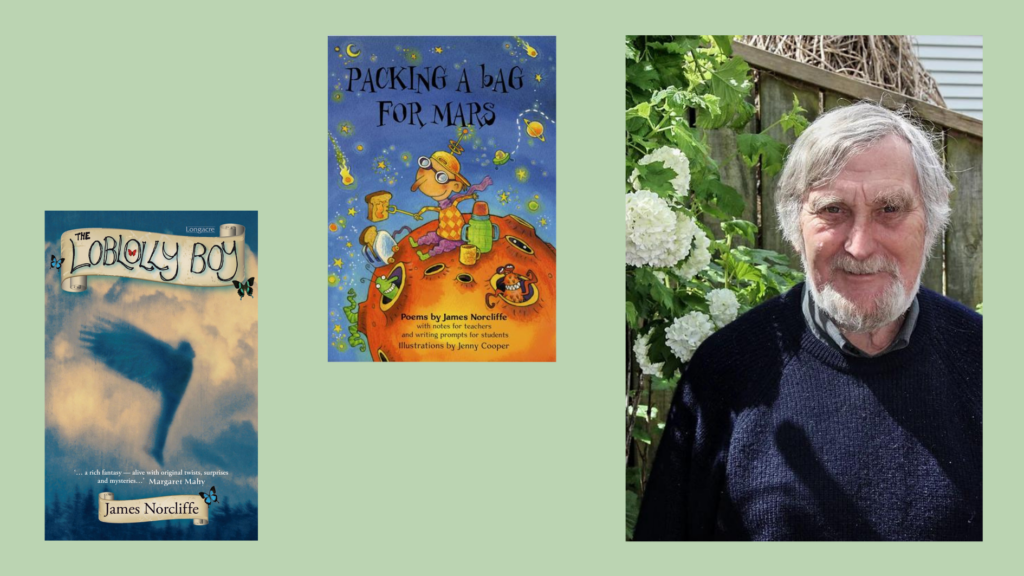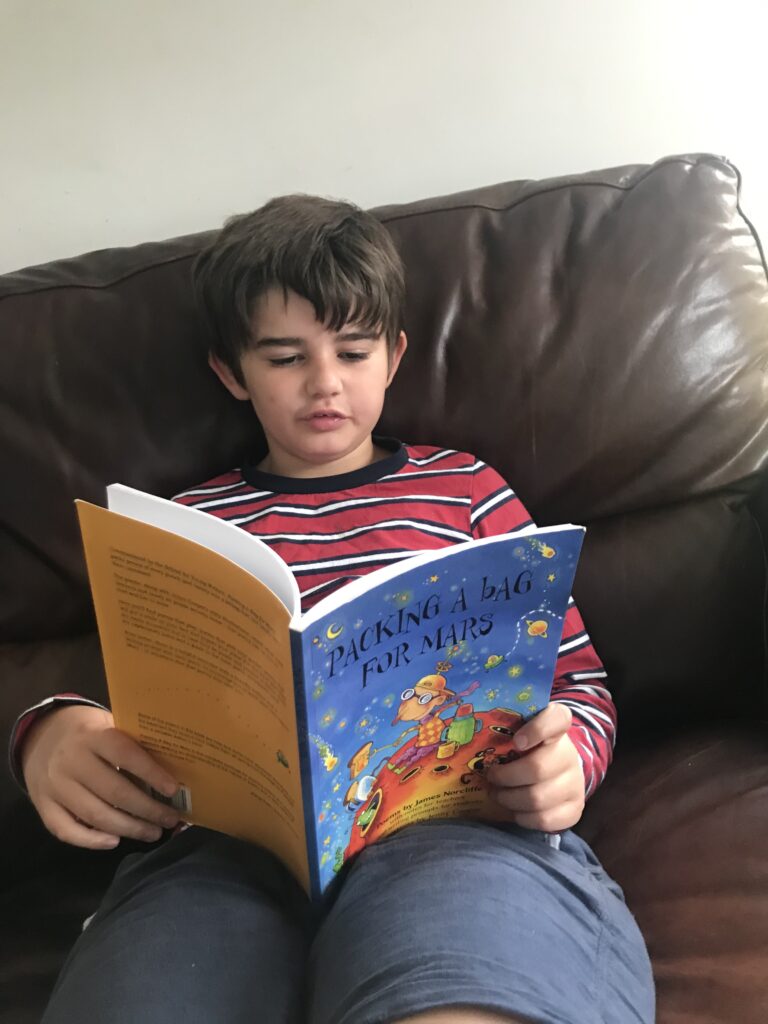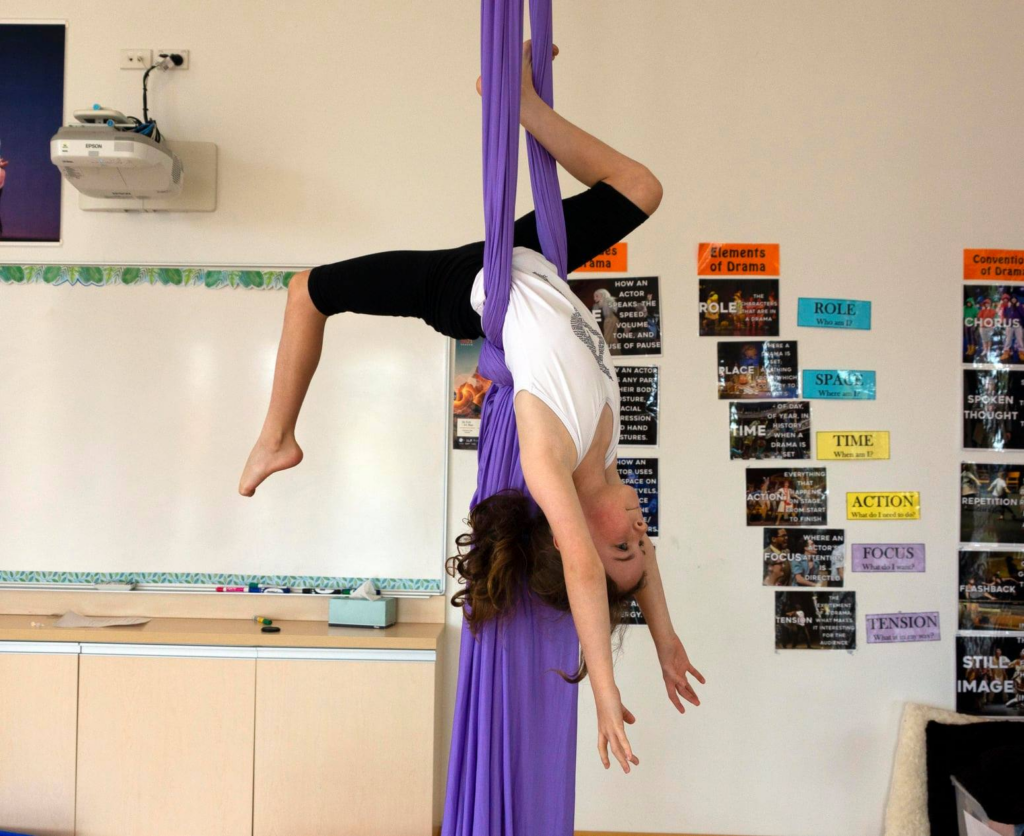Beloved writer James Norcliffe is the well-deserving winner of the 2023 Storylines Margaret Mahy Medal. Ruth Agnew, with the help of students Wills and Rose, shows us the power of Norcliffe’s writing to dazzle and inspire the next generation of writers and readers.

On the southern shores of Lyttleton sits the tiny township of Diamond Harbour. Its name refers to the sunlit sparkling waters of the area, but could easily be mistaken as a reference to one of its residents, a veritable rare gem of NZ literature, the luminous James Norcliffe, recipient of the 2022 New Zealand Prime Minister’s Award for Literary Achievement in Poetry and the 2023 Storylines Margaret Mahy Medal. While Norcliffe’s work may be familiar to many, the extent to which his words brighten young readers and writers may not be clear. For those less familiar with this Ōtautahi literary treasure, I would like to share some shining James Norcliffe moments I have experienced.
James Norcliffe is a poet, fiction writer, anthology editor and inspirational educator of young creative writers. He has published 11 collections of poetry, a short story collection, an adult novel, and several award-winning novels for young people, and another poetry collection is about to be launched at the upcoming Storylines festival.
My introduction to Norcliffe’s poetry did not take place between the pages of a book, but inside a tram. I can’t remember the other poets who took part in this merging of public transport and poesy, but I will never forget the way Norcliffe’s strong, resonant voice grumbled above the rumbling rhythm of the streetcar, his words perfectly placed as we circled the city centre. Years later, when those same streets shook, quaked and cracked and no trams could run, Norcliffe read amongst the rubble. At a Gapfiller post-quake poetry performance he read words of solace surrounded by broken buildings, coaxing laughter from his listeners with his clever wordplay and irreverent humour. Eschewing solemn diatribes of resilience and rebuilding, Norcliffe began his set with “Yipee!”, a poem that opens with: When the podiatrists escaped, we immediately set up road blocks but they were wise to us and used the footpaths.
There is a particular joy in recognising local landscapes in a Norcliffe poem, in the blend of the familiar features and insightful observations
Obviously, Norcliffe is much more than a local poetry peddler. His novel The Loblolly Boy and its sequels are published in America, and before he was picking poems for the pages of The Press newspaper or mentoring young minds in Mairehau and in the Arts Centre (the original home of The School For Young Writers), Norcliffe taught in Brunei and China. There is a particular joy, however, in recognising local landscapes in a Norcliffe poem, in the blend of the familiar features and insightful observations. This is the brilliance of Norcliffe’s writing. He captures the reader with a shared sense of place or experience, then offers a new perspective. This is particularly effective amongst his younger fans. Instead of offering my old-person opinion of how Norcliffe’s poetry speaks so clearly to children, I’d like to refer to two emerging literary critics, eleven-year-old Wills and ten-year-old Rose, and share their experiences with Norcliffe’s words.
Birdling’s Flat/Motukarara
By James Norcliffe
it was a place of magic
talking stones
and unblinking lizards on the dry hills
the wind blew jackets wide open
and the cries of wild discovery away
the gravel sucked back into the sea
the marram grass lifted and fell
the old car had rolled over a road
which rolled over compacted dunes
the leaf-springs groaned and the shock
absorbers were in need of glycerine
sand flew at the windscreen and flickered
there after the handbrake finally creaked
and still flickered into our eyes when
we ran from the car into the wild wind
our hair sweeping like marram grass
donkey jackets flowing laughing crying
abracadabra Motukarara
blind to the lizards and deaf to the stones

When Wills first read ‘Birdling’s Flat Motukarara’, he looked up from the page, eyes wide with excitement, saying, “I know this place!” For a nine-year-old, it was magical to discover such a detailed description of the rocky, wind-whipped beach. The recognition and connection Wills felt fuelled his interest in diving deeper into the poem, to explore the sounds and words. We were not sitting at desks in a classroom as we unpacked the clever onomatopoeia and sprung rhythm. I had come over to visit on a sunny Saturday morning, a time Wills usually spent outside playing cricket. I happened to have a copy of Packing a Bag For Mars with me, Norcliffe’s 2012 poetry collection. ‘Birding’s Flat/ Motukarara’ was the gateway for Wills to a wider world of words, and before lunchtime, he had penned his own verse following one of the creative writing prompts offered alongside the poems. Two years later, Wills can still recite ‘Birdling’s Flat’ by heart, and he has won awards for performing it in competitions, and continues to write his own poetry. Looking at the poem Wills wrote that day, I am impressed by the way he has echoed the playfulness of Norcliffe’s rhyme and rhythm schemes, and his wordplay and humour.
Life on Mars
By William Gumbley
Cola and corn chips, chocolate and sweets,
For my new life on Mars I need more than just treats.
Games I can play, books I can read…
What else do I take to Mars to succeed?
A pair of boxing gloves so I can fight
Apollo Creed if he appears in the night
(Is there nighttime on Mars? Do I need my pajamas?
If there isn’t a nighttime, no morning alarm-as!)
I’ll wear red camouflage so in I will blend
No one will see me and you can’t pretend!
Oh wait, will there be oxygen and trees?
Without them I can’t have any happy or glees!
So I’m off to Mars, see you all later
Hope you don’t get eaten by Earth alligators!
Norcliffe’s humour is definitely one of the reasons his poetry is so popular with young readers, but he doesn’t rely upon jokes to keep kids turning pages. ‘Trapeze’ is a challenging poem for a reader of any age; each swooping rhythmic line presenting a potential challenge such as a pun constructed out of a French phrase, or a word unlikely to feature in primary school conversations (parabola). Rose was drawn to the poem because she recognised the sense of anticipation and excitement of the trapeze artist. Rose has never swung on a trapeze, but as an accomplished ballet dancer who had recently begun lessons in aerial silks, she knew the sense evoked in the very first lines.
Norcliffe’s humour is definitely one of the reasons his poetry is so popular with young readers, but he doesn’t rely upon jokes to keep kids turning pages
Trapeze
By James Norcliffe
The thrill is in the possibility
Not that she will
But that she won’t make it
That the parabola will fade
Stop and the very air will arc
Between her fingers and the rung
And that in that sequinned flash
The sawdust ring will rocket
Up to catch her clumsy fall
Of course she never will
Since her first pied-a-tete
She has learnt to stop breath
Upside down and inside out
To swallow dive on the intake
And lift again in the gasp
To swoop in a swooping
Ellipse of light and to laugh
In spite of the spite she spites

James Norcliffe is a local literary diamond, deserving of the two prestigious titles recently bestowed upon him. He will be presented with his Margaret Mahy medal on Sunday 2 April at the University of Auckland Epsom Campus, and will deliver his 2023 Storylines Margaret Mahy lecture. If you have yet to experience the joy of Norcliffe’s poetry and prose, I recommend heading along to hear him speak. Norcliffe’s words have taken me from local landscapes through a quake-ravaged city, to familiar shorelines of this world, and the ride isn’t over yet.

Ruth Oy Har Agnew
Ruth is a writer and teacher of Chinese and Pākehā descent from Ōtautahi Christchurch. She has written for Theatreview, The Press, Stuff, Flat Takahe, What’s Up Christchurch, and the Playmarket Annual. She is an experienced actor, and currently works supporting young performers as a speech and drama teacher.



